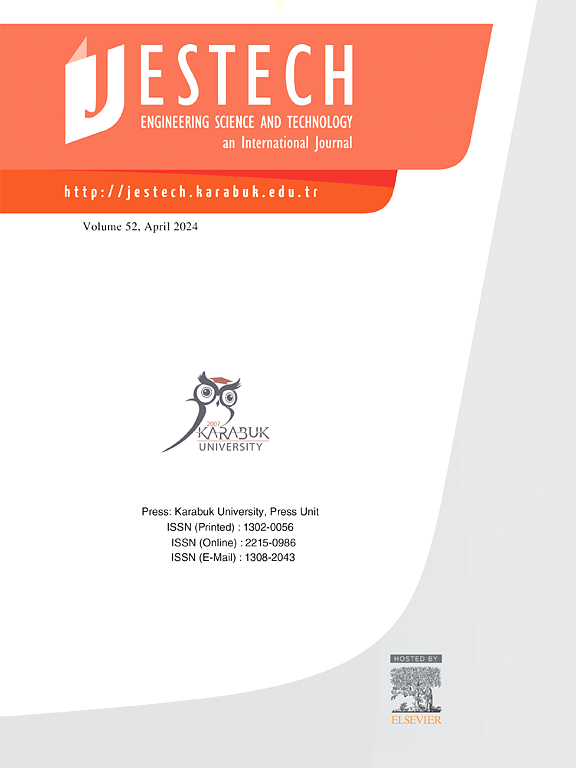Using regression trees for improving the efficiency of nonlinear programming solvers
IF 5.4
2区 工程技术
Q1 ENGINEERING, MULTIDISCIPLINARY
Engineering Science and Technology-An International Journal-Jestech
Pub Date : 2025-03-12
DOI:10.1016/j.jestch.2025.102012
引用次数: 0
Abstract
Optimization plays a critical role in fields such as economics, engineering, and computational sciences, where finding the optimal values of decision variables is essential for the design of a product, production system, or service system. However, many optimization problems remain challenging even with advanced solvers. This study integrates machine learning into optimization by employing a regression tree algorithm that is trained on sampled solutions of the problem to improve the efficiency of derivative-free nonlinear programming solvers. The approach is tested on 24 single-objective functions to reduce the domain of decision variables. The results demonstrate better accuracy and consistency in the solver performance. Incorporating a machine learning technique into an optimization method can be extended to solve black-box optimization problems and paves the way for innovative solutions in engineering design and other domains.
利用回归树提高非线性规划求解器的效率
优化在经济学、工程学和计算科学等领域起着至关重要的作用,在这些领域中,找到决策变量的最优值对于产品、生产系统或服务系统的设计至关重要。然而,即使有先进的求解器,许多优化问题仍然具有挑战性。本研究通过采用回归树算法将机器学习集成到优化中,该算法在问题的采样解上进行训练,以提高无导数非线性规划求解器的效率。该方法在24个单目标函数上进行了测试,以减少决策变量的域。结果表明,求解器的性能具有较好的准确性和一致性。将机器学习技术整合到优化方法中可以扩展到解决黑盒优化问题,并为工程设计和其他领域的创新解决方案铺平道路。
本文章由计算机程序翻译,如有差异,请以英文原文为准。
求助全文
约1分钟内获得全文
求助全文
来源期刊

Engineering Science and Technology-An International Journal-Jestech
Materials Science-Electronic, Optical and Magnetic Materials
CiteScore
11.20
自引率
3.50%
发文量
153
审稿时长
22 days
期刊介绍:
Engineering Science and Technology, an International Journal (JESTECH) (formerly Technology), a peer-reviewed quarterly engineering journal, publishes both theoretical and experimental high quality papers of permanent interest, not previously published in journals, in the field of engineering and applied science which aims to promote the theory and practice of technology and engineering. In addition to peer-reviewed original research papers, the Editorial Board welcomes original research reports, state-of-the-art reviews and communications in the broadly defined field of engineering science and technology.
The scope of JESTECH includes a wide spectrum of subjects including:
-Electrical/Electronics and Computer Engineering (Biomedical Engineering and Instrumentation; Coding, Cryptography, and Information Protection; Communications, Networks, Mobile Computing and Distributed Systems; Compilers and Operating Systems; Computer Architecture, Parallel Processing, and Dependability; Computer Vision and Robotics; Control Theory; Electromagnetic Waves, Microwave Techniques and Antennas; Embedded Systems; Integrated Circuits, VLSI Design, Testing, and CAD; Microelectromechanical Systems; Microelectronics, and Electronic Devices and Circuits; Power, Energy and Energy Conversion Systems; Signal, Image, and Speech Processing)
-Mechanical and Civil Engineering (Automotive Technologies; Biomechanics; Construction Materials; Design and Manufacturing; Dynamics and Control; Energy Generation, Utilization, Conversion, and Storage; Fluid Mechanics and Hydraulics; Heat and Mass Transfer; Micro-Nano Sciences; Renewable and Sustainable Energy Technologies; Robotics and Mechatronics; Solid Mechanics and Structure; Thermal Sciences)
-Metallurgical and Materials Engineering (Advanced Materials Science; Biomaterials; Ceramic and Inorgnanic Materials; Electronic-Magnetic Materials; Energy and Environment; Materials Characterizastion; Metallurgy; Polymers and Nanocomposites)
 求助内容:
求助内容: 应助结果提醒方式:
应助结果提醒方式:


